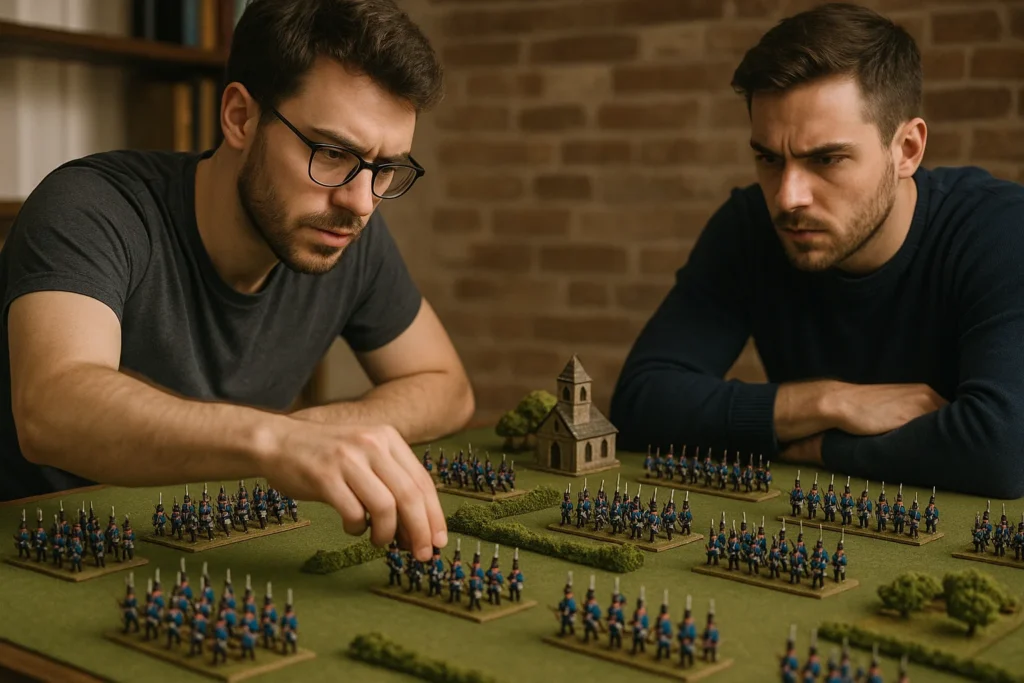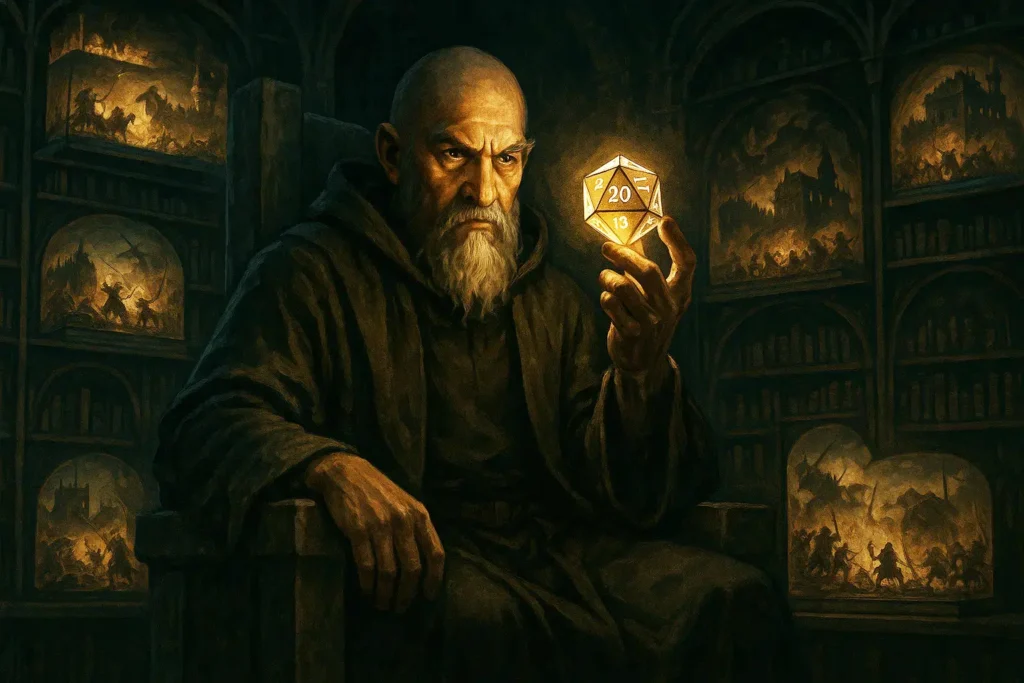We live in an age of instant outrage and shallow engagement. Complex ideas are reduced to slogans; history is flattened into moral fables. Nowhere is this intellectual decay more evident than in the casual dismissal of one of the most potent tools for strategic thinking ever devised: the tabletop wargame. It is often written off as a niche, overly complex hobby—a sign of a mind incapable of confronting the discipline, patience, and sober lessons of reality.
This is not a new phenomenon. The modern hobbyist’s table, scattered with meticulously painted miniatures and hex-gridded maps, is the direct descendant of the officer’s mess and the war college lecture hall. Before Dungeons & Dragons allowed us to adventure as individuals, wargames taught us how to command armies. And they did so not for entertainment, but for survival.
The Kriegsspiel Crucible
The origins are unequivocally martial. In early 19th-century Prussia, Baron von Reisswitz formalized Kriegsspiel, or “wargame.” This was not a pastime. It was a brutal, rules-based simulation designed to strip away the ego of junior officers and force them to confront the unforgiving physics of war. The game incorporated detailed maps, scaled movement, supply line logistics, and the all-important “fog of war.”

The goal was truth. Cadets refought Waterloo and Austerlitz not to glorify battle, but to understand it. They learned that a regiment delayed by mud could mean a flank collapse. They saw how a cavalry charge, glorious in a painting, could be shredded by well-positioned artillery. This was a system built on cause and effect, where excuses were worthless and the terrain did not care about your intentions. The Prussian military’s subsequent success was no accident; it was the product of a culture that valued this kind of rigorous, dispassionate preparation. Out of this crucible emerged not merely better officers, but a new way of thinking—one that prized consequence, structure, and restraint.
The Intellectual Toolkit
The value of wargaming lies in the cognitive muscles it forces you to develop, virtues that are anathema to our modern sensibilities:
- Consequential Thinking: Every move is a commitment. You cannot undo a disastrous cavalry charge. This teaches foresight and the acceptance of responsibility—a stark contrast to the reset-button culture of video games and the endless second chances of online discourse.
- Systemic Analysis: A wargame is a complex system of interlocking parts—morale, supply, terrain, weather, unit cohesion. Victory goes to the player who can understand and manipulate the system as a whole, not just react to the immediate threat. This is the essence of strategy versus mere tactics.
- Embracing Hierarchy and Role: You are a commander. Your job is not to be a hero on the front line but to manage resources, issue clear orders, and trust your subordinates. It is an exercise in leadership and the acceptance of a defined role within a hierarchy, a concept increasingly foreign in our era of radical individualism.
- A Dialogue with History: To play a historical wargame is to engage in a form of practical historiography. You gain an intimate appreciation for the challenges faced by historical commanders that no textbook can provide. You understand the weight of Robert E. Lee’s decisions at Gettysburg on a visceral level when you see your own Pickett’s Charge break against a pixelated stone wall.
From General to Hero: The Wargaming DNA of Roleplaying
To understand original Dungeons & Dragons, one must first stop thinking of it as a standalone invention. It was not. It was a brilliant mutation within the ecosystem of 1970s wargaming. The game Gygax and Arneson created didn’t just borrow rules from Chainmail; it imported an entire worldview.
The most crucial carryover was the role of the Dungeon Master. Today, the DM is often seen as a “storyteller.” In its original conception, the DM was the Referee. This term, lifted directly from wargaming, is profoundly revealing. A referee’s job is not to ensure the players feel good. A referee’s job is to be an impartial arbiter of the rules and the world. They represent objective reality. They are the terrain, the weather, the monsters’ instincts, and the unforgiving laws of physics. The referee doesn’t “create a story”; they adjudicate the players’ actions within a simulated environment. The “story” is just the emergent record of who lived, who died, and what they accomplished.

This ethos forces accountability. A foolish decision results in character death, not a narrative correction to keep the “plot” on track. The wargaming roots guaranteed that early D&D was a game of player agency in its purest form. Your survival depended on your own wit, caution, and strategic cunning. There were no plot shields. You were an adventurer—a fragile, mortal entity in a dangerous world. Your glory wasn’t preordained; it was earned through demonstrated competence. Wargaming, in other words, trained generations of young men not to escape reality—but to bear it.
The Modern Retreat from Reality
Today, our strategic simulations have largely been replaced by power fantasies and ideologically sanitized narratives. Mainstream video games often prioritize spectacle over substance, offering curated experiences where the player is a superhuman protagonist and the “strategy” is a thin veneer over scripted events. Even historical titles are now pressured to rewrite the past to conform to political dogma—stripping away the very truths that once made them worth playing.
The casual dismissal of wargaming as a tedious relic is the symptom of this retreat. It is the rejection of a tradition of mastery—of painstakingly learning rules, studying history, and patiently executing a plan. It favors the immediacy of the hot take over the slow burn of cultivated expertise. It is an admission that the arduous path to true understanding is too demanding.
This same technique of diminishment has been used to shame other deep, male-coded hobbies. Model railroading is reduced to “boys playing with trains,” ignoring the immense historical research, electrical engineering, and artistic craftsmanship involved. Male gamers were long shamed as basement-dwellers “just playing video games,” a deliberate tactic to pathologize spaces of male mastery, competition, and non-socially-approved ambition. These hobbies represent the masculine creative impulse: not to merely consume, but to build, organize, and master complex systems. Every hobby that teaches mastery becomes a target, because mastery implies hierarchy—and hierarchy implies truth.
Conclusion: Reclaiming the Map Table
The tabletop wargame, in its pure form, remains a bastion of intellectual honesty. It is a demanding hobby that requires patience, research, and a respect for fact. In a world eager to replace truth with sentiment, it stands as a quiet rebellion. It teaches us that some problems cannot be solved with good intentions, that leadership carries a heavy burden, and that history’s lessons, while hard, are the only ones worth learning.
So, let them mock. While they scroll, we will be studying the topography of Austerlitz, learning the lessons that built empires and saved nations. Some of us still believe in the importance of maps, of mastery, of meeting reality on its own terms.
—Wolfshead





I guess I don’t have to tell you how much wargaming or historical interest in military things is frowned upon in Germany. But it is indeed not only that, it is hate towards anything male. It starts with hobbies and ends in re-education and miseducation of boys already in earliest school age.
This is a grave danger as most teachers nowadays are predominantly female and the whole institution got feminized, to the great detriment of boys.
Funnily, these strong women often can’t handle an underage Turkish boy who believes himself to be Sultan Mehmed himself anymore. They are great at bullying and twisting not so aggressive boys.
Warhammer 40K is in grave danger, even the makers recently pulled a “ofc there were always female Custodes” nonsense move. They backtracked. Gamers dodged a bullet there, and Games Workshop as well.
Men need this to become the men they could and should be. Leaders, protectors, fathers. Of their community and their family. Turn men into disturbed man-women and socialism and wokeism succeeded in destroying society. That’s what these deranged minds are all about, they really can only destroy, not create.
The more I learn about Germany, the less I understand it. It seems to be me that Germany has lost the will to live.